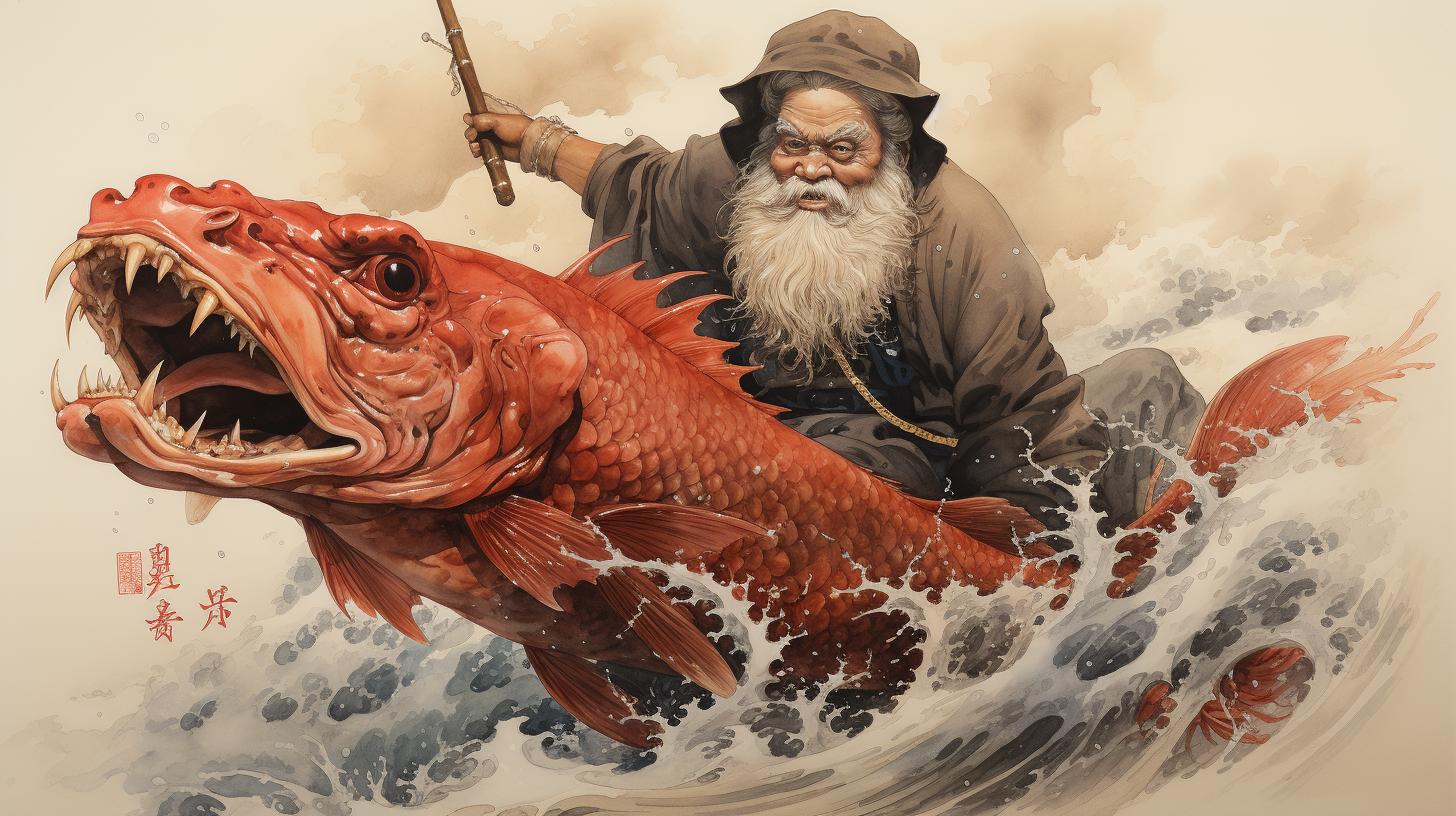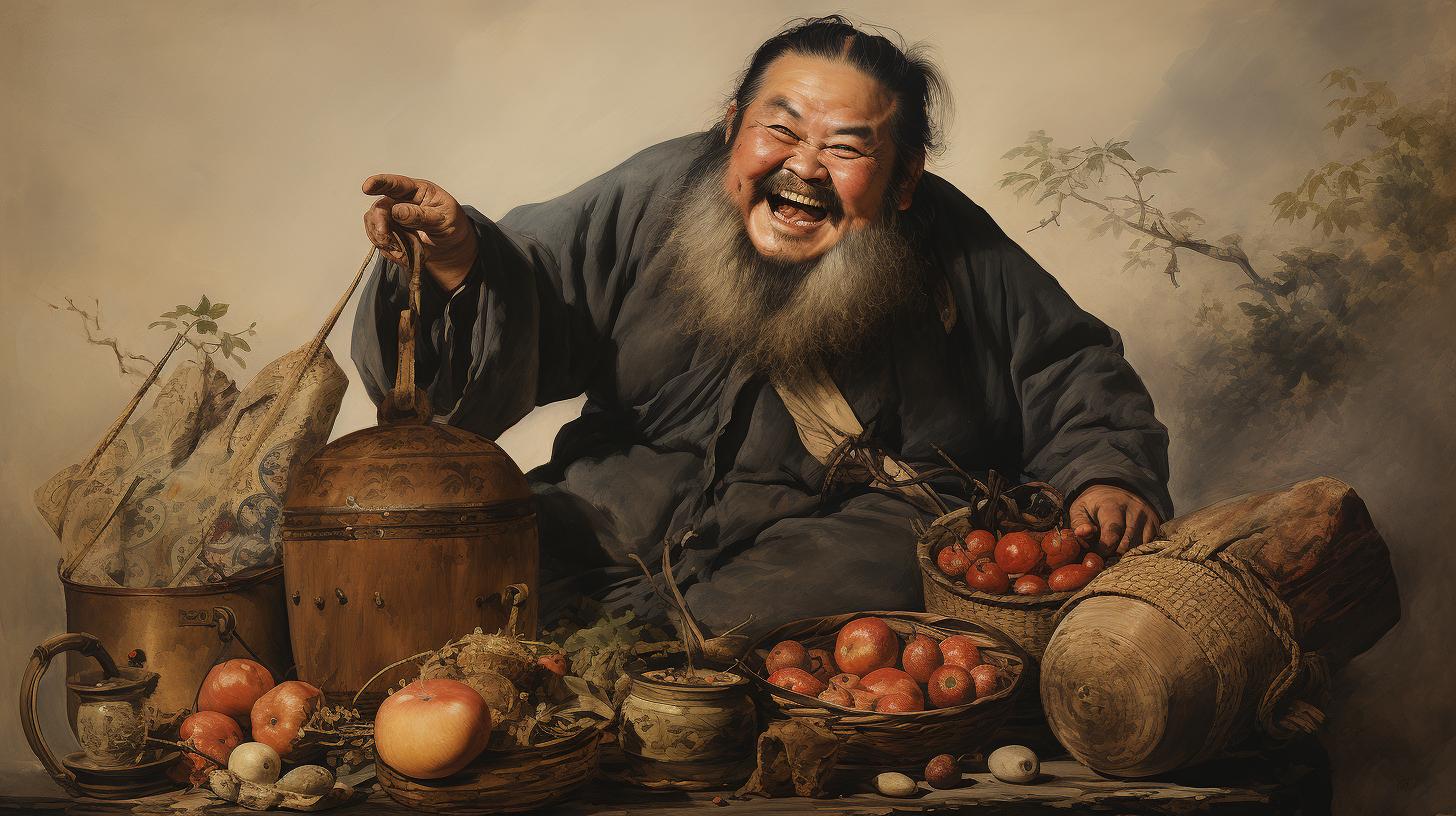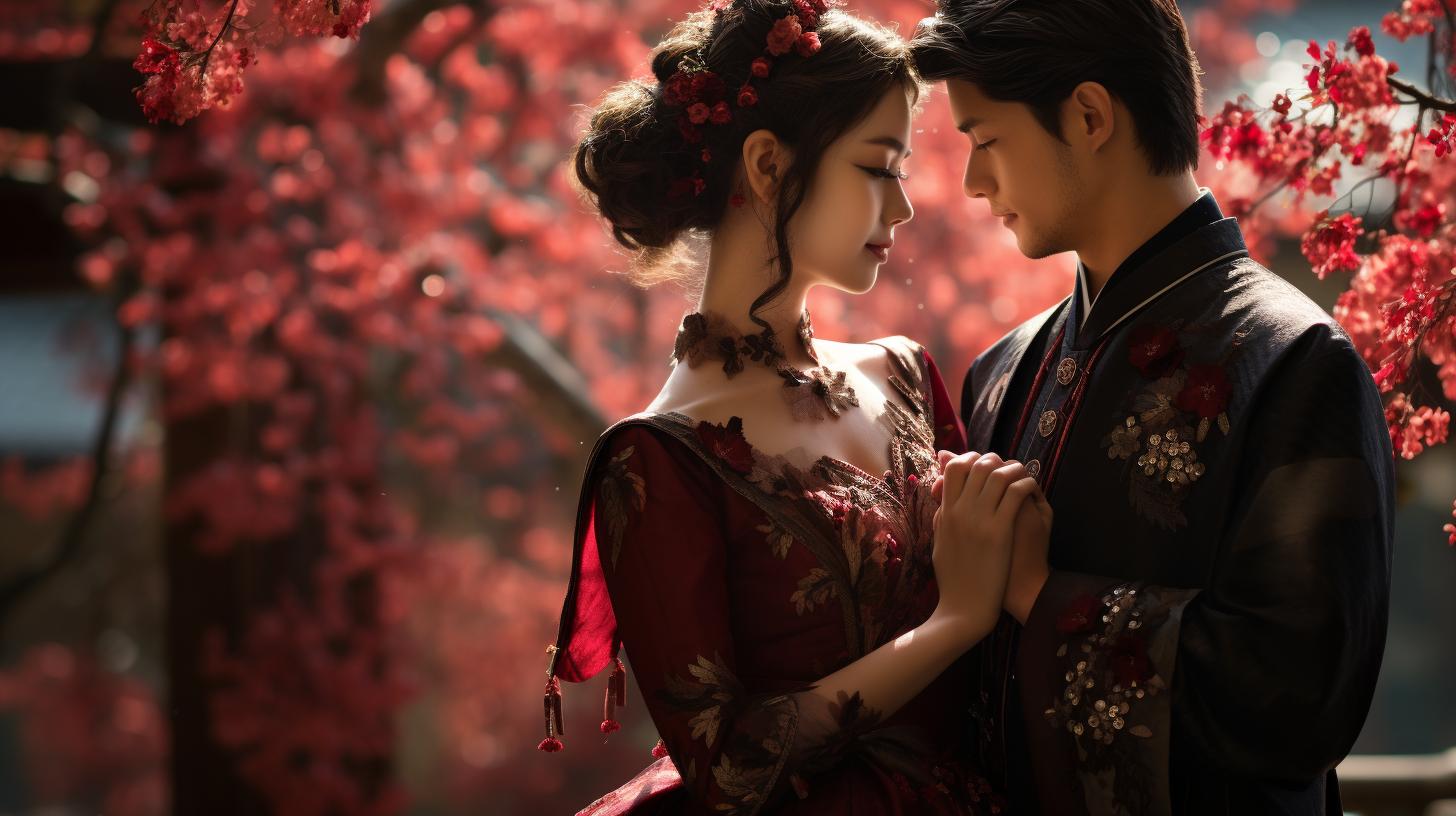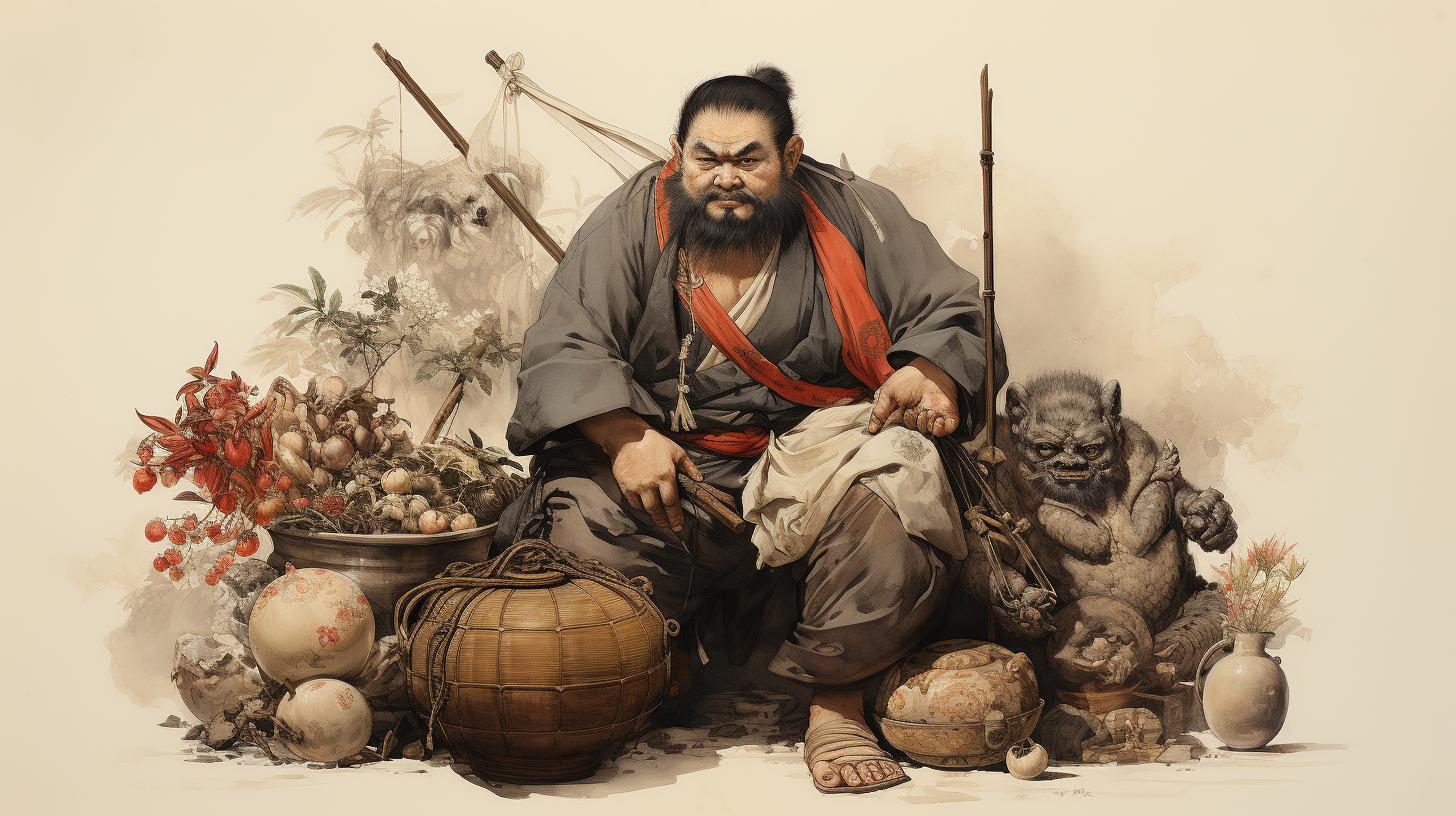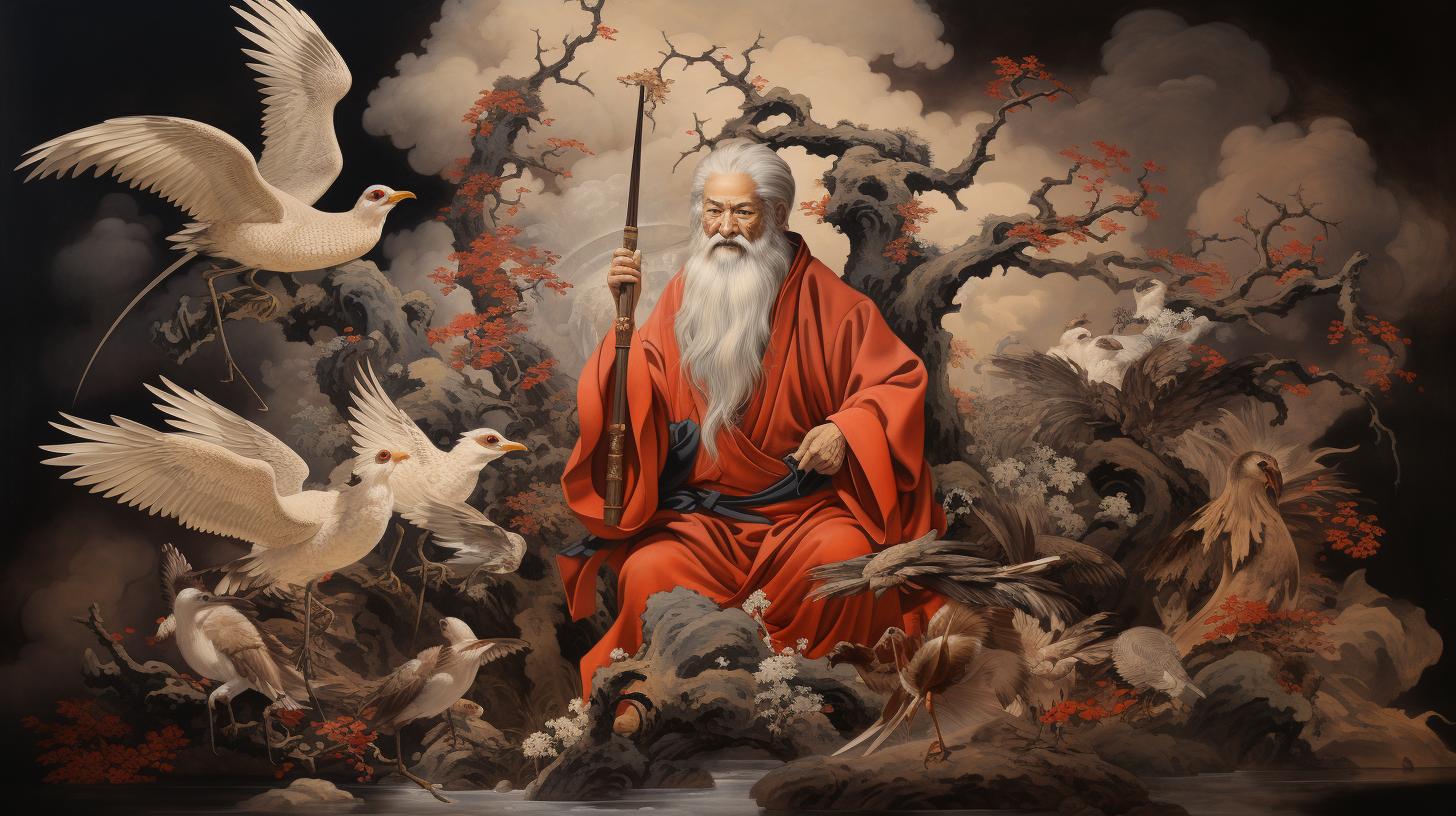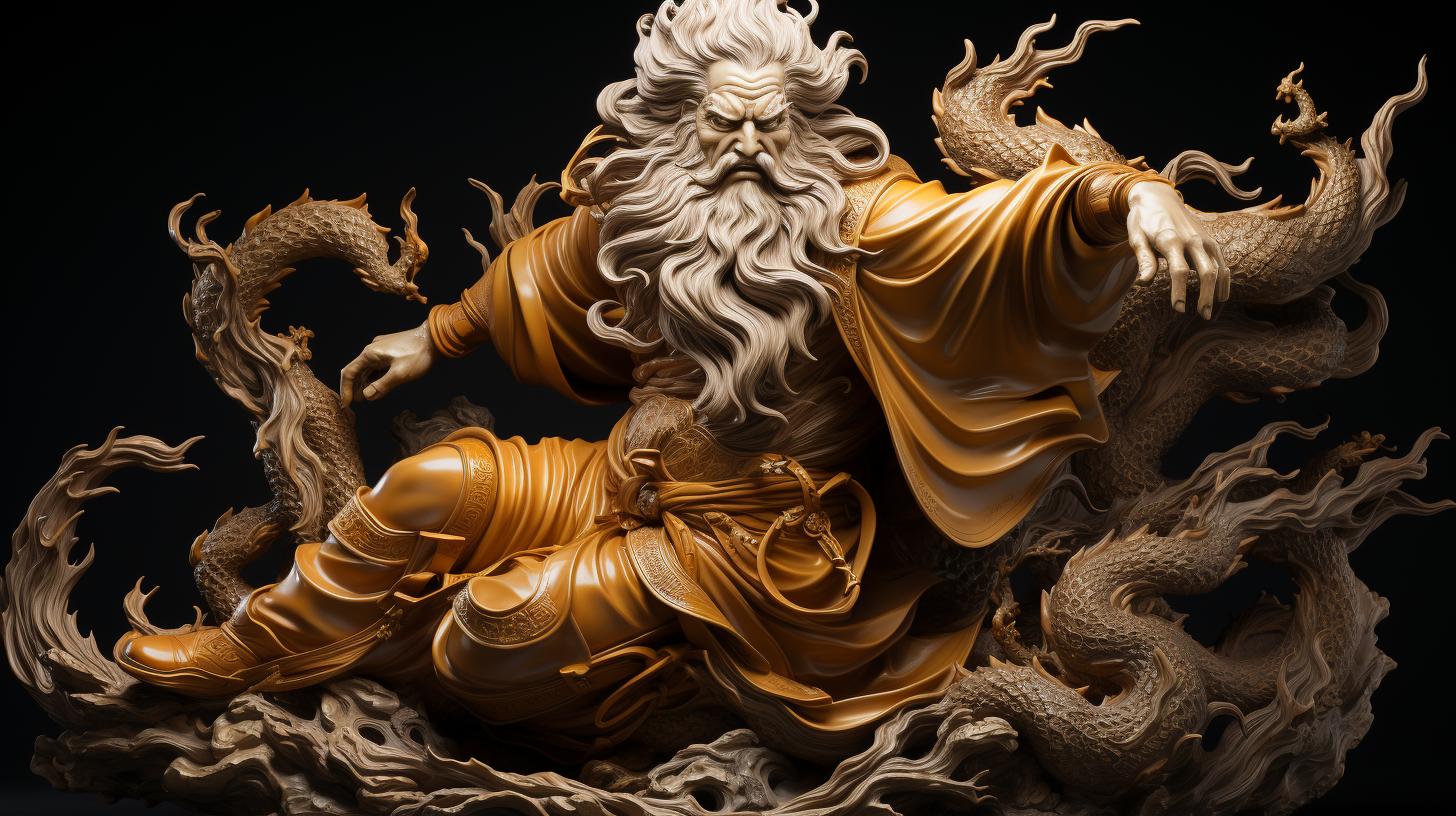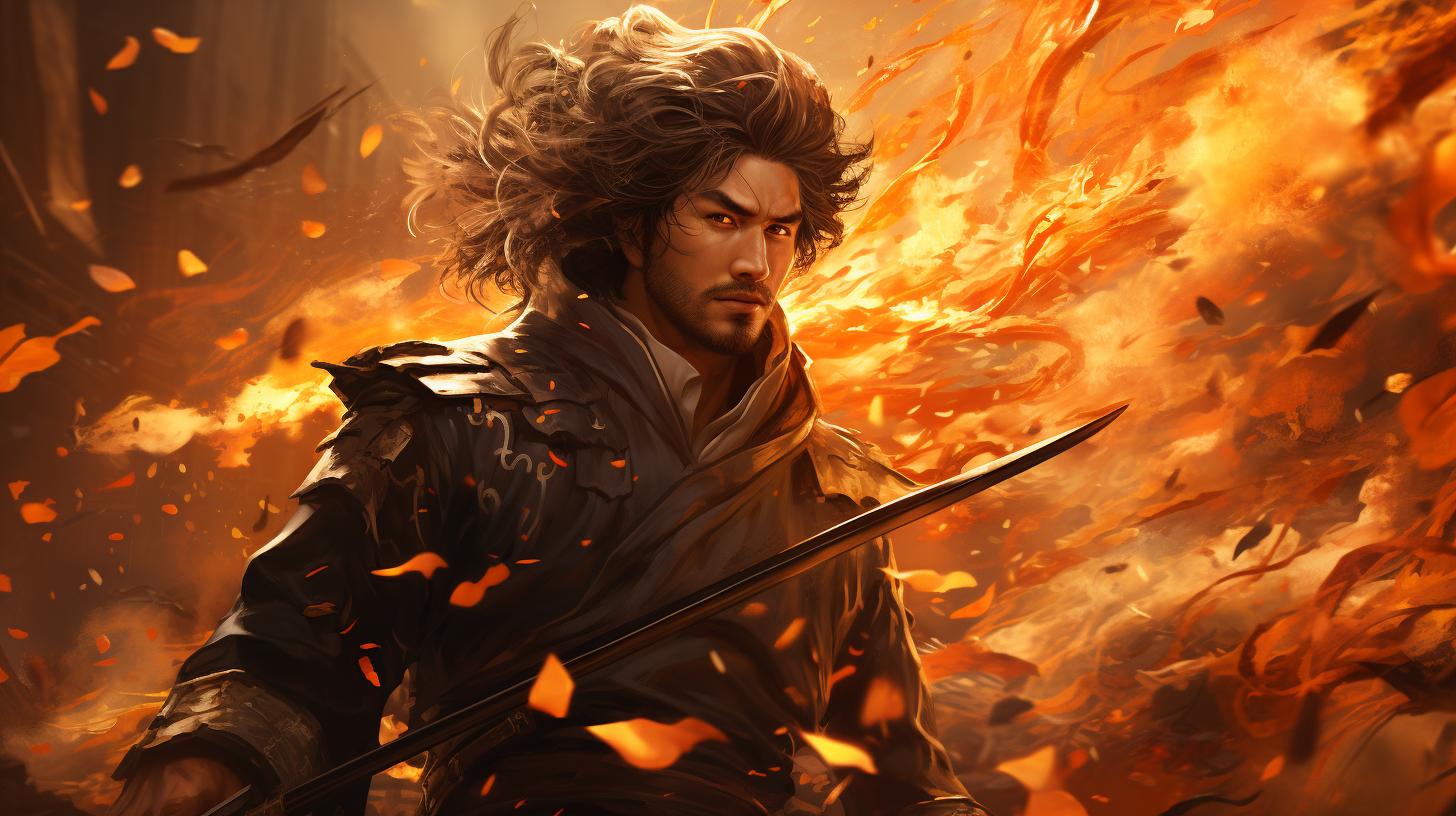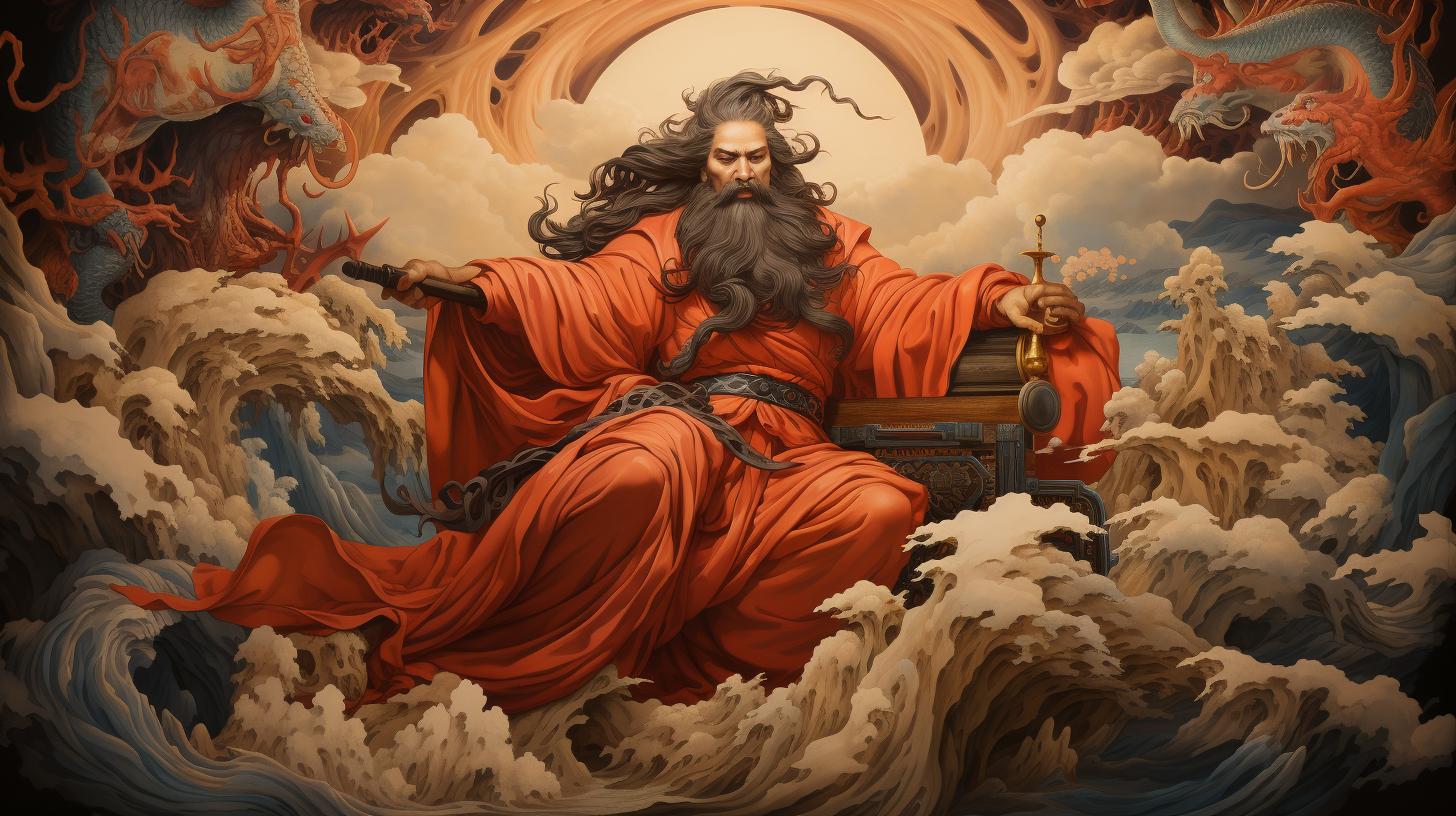Ebisu Mythology: The Prosperous and Lucky God of Japan
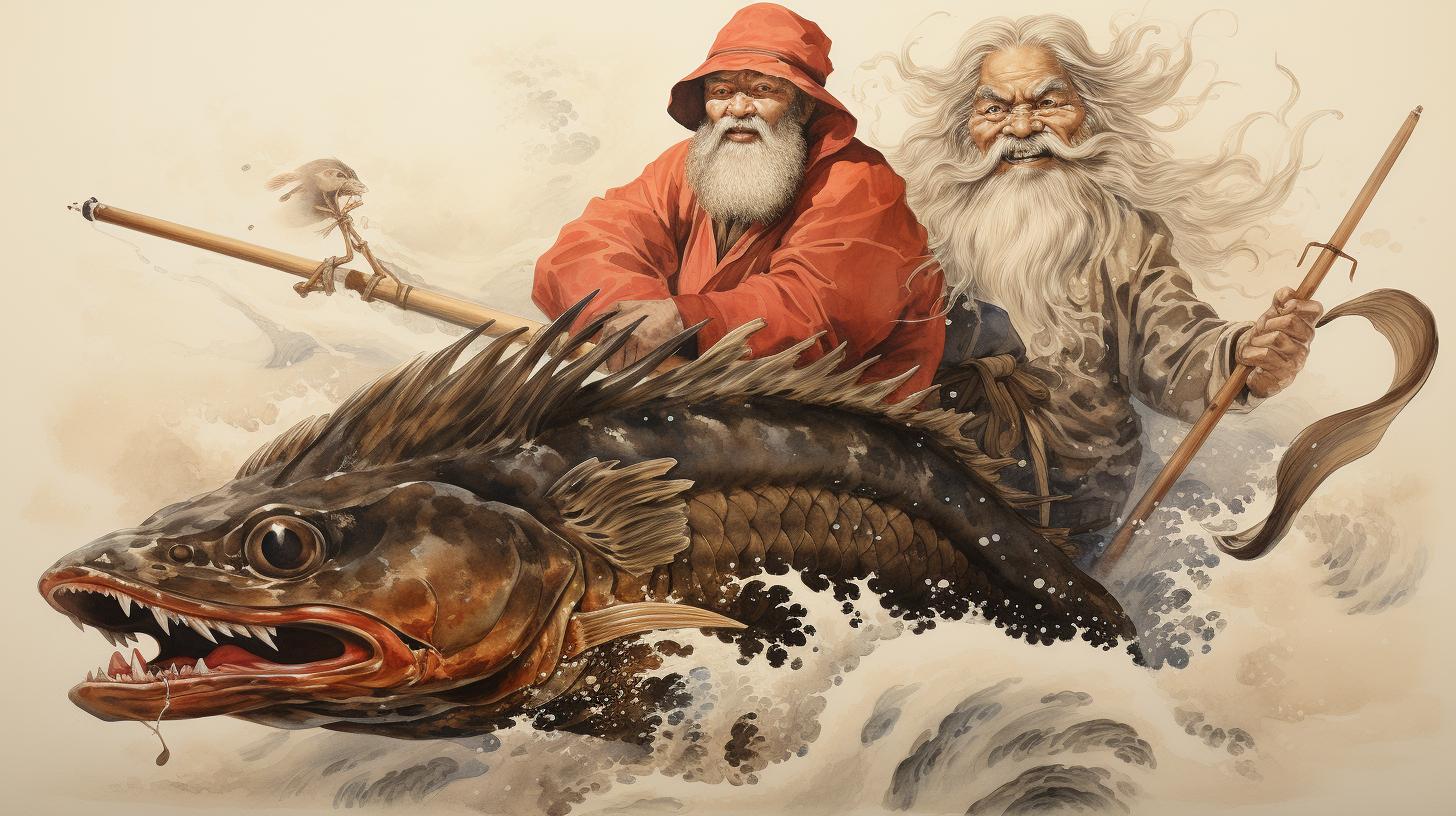
Ebisu is a Japanese god of luck, fortune, and prosperity. Worshiped as one of the Seven Lucky Gods, Ebisu is known for his association with the sea and fishing. He is often depicted as a cheerful fisherman with a big hat, a fishing rod, and a big fish.
With a rich mythology and deep cultural significance, Ebisu is a beloved figure in Japan. In this article, we will explore the origins, symbolism, worship, and pop culture significance of Ebisu mythology.
Ebisu Mythology: The God of Luck and Fortune
The Origins of Ebisu
The origins of Ebisu are shrouded in mystery, although many myths and legends have attempted to explain his existence. One of the most popular stories tells of how he was the first son of Izanagi and Izanami, the creators of the world, but was discarded due to his imperfections.
Another tale says he was a boy named Hiruko, born without bones, who was abandoned by his parents and floated to sea, where he was found and raised by the Ainu deity named Ebisu Saburo.
Despite his difficult beginnings, Ebisu overcame his obstacles and became known as a cheerful and generous god associated with good fortune. His origins, however, remain mysterious, giving him an air of enigma and intrigue in Japanese mythology.
Ebisu in Japanese Mythology
Ebisu is considered one of the Shichi Fukujin, or Seven Lucky Gods of Japan, and is the only member of the group who is indigenous to Japan. He is also known as the patron god of fishermen and those who work on the sea, due to his strong association with fishing and the abundance of sea life.
Ebisu is often depicted as a plump, jolly fisherman who is always smiling and laughing. This image has become synonymous with luck and prosperity in Japan, and his likeness is frequently used in shops and businesses.
Despite his jovial appearance, however, Ebisu is believed to hold great power and influence over matters of wealth and success, making him a highly revered and respected deity in Japanese culture.
The Many Faces of Ebisu in Japanese Culture
Ebisu has taken on many different forms and roles in Japanese culture over the centuries, and his image and symbolism have been adapted to suit various purposes. For instance, Ebisu is often depicted in paintings, sculptures, and other forms of art, with many artists adding their own personal touches to his image.
- Ebisu in the Edo Period: During this time, Ebisu became particularly popular with the working class, who saw him as a symbol of their perseverance and hard work. As a result, he was frequently depicted in local shrines and temples, often with a sake jug in hand.
- Ebisu in Contemporary Culture: Today, Ebisu’s image and symbolism continue to be used in a variety of ways in modern-day Japan.
For instance, he is often featured on clothing and merchandise, and is frequently referenced in pop culture, including anime and manga.
- Ebisu as a God of Business: In recent years, Ebisu has become a increasingly popular as a god of business success, representing good fortune and prosperity in the competitive world of entrepreneurship.
His likeness is often found in offices and business establishments throughout Japan, and many entrepreneurs and startup owners pray to him for success.
The Symbolism of Ebisu in Japanese Society
Ebisu, the Japanese god of luck and prosperity, has deep symbolism in Japanese society.
His image and legend are tied to several key aspects of Japanese culture, including wealth, fishing, and business success. Moreover, Ebisu can be found in various contemporary cultural forms in Japan.
Ebisu and Wealth
Ebisu has long been connected to wealth in Japanese culture. The fish he represents are not only seen as a source of food but also as a critical resource for the Japanese economy, with a major fishing industry that produces billions of dollars of exports each year.
The fishing industry is a hugely significant part of Japan’s economy, and Ebisu’s association with fishing has made him a symbol of good fortune regarding wealth and prosperity.
Ebisu and Fishing
The link between Ebisu and fishing is a central aspect of his symbolism. Ebisu is traditionally depicted as a fisherman, wielding a fishing rod and holding a large fish, usually a sea bream or red snapper.
This fish is highly prized in Japanese culture and is seen as a sign of prosperity. In contrast, the resourceful nature of Japanese fishermen and their association with luck and good fortune is linked to the story of Ebisu.
Ebisu and Business Success
Ebisu is also closely associated with business success in Japan. His image is commonly seen in shops and businesses, with business owners hoping to benefit from his presence. Many believe that displaying an image of Ebisu helps attract customers and encourages good fortune.
Ebisu in Contemporary Culture
The image of Ebisu has been utilized in several contemporary forms of Japanese culture, including clothing brands, anime, and video games. The beer brand Yebisu, for example, uses Ebisu’s name and image for its product.
Meanwhile, the manga series Naruto features a character named Ebisu who is a master in the art of taijutsu, or physical combat.
Overall, the symbolism of Ebisu in Japanese society is profound. From fishing and wealth to business success and contemporary culture, Ebisu’s presence can be felt throughout Japanese culture, reflecting the country’s deep connection to its mythology and traditions.
The Connection Between Ebisu and Other Japanese Deities
Ebisu is not only a beloved figure in his own right but is also linked to other deities in Japanese mythology. These connections offer insight into the rich religious and cultural traditions of Japan.
The Seven Lucky Gods
In Japanese mythology, Ebisu is one of the Seven Lucky Gods, also known as the Seven Gods of Fortune. The other six deities are Hotei, Daikokuten, Bishamonten, Benzaiten, Fukurokuju, and Jurojin.
Each of these gods represents a different aspect of good fortune, and their popularity has spread beyond Japan to be celebrated in other Asian countries.
Daikokuten and Ebisu
Daikokuten is another deity commonly associated with Ebisu. Daikokuten is the god of agriculture, commerce, and wealth, and is often depicted with Ebisu in Japanese shrines and festivals.
Together, the two gods represent a powerful combination of prosperity and good fortune.
Hiruko and Ebisu
The connection between Ebisu and Hiruko goes back to the earliest Japanese mythology. Hiruko is the first-born child of Izanagi and Izanami, who was born without limbs and abandoned in the sea.
According to some myths, Hiruko was rescued by a kami named Awashima, who raised him as her own child. Hiruko eventually transformed into Ebisu, becoming the god of fishermen and good fortune.
Izanagi, Izanami, and Ebisu
Ebisu is also linked to the mythological creators of Japan, Izanagi and Izanami. Some stories suggest that Ebisu was their first child, who was born without bones and cast into the sea.
Ebisu was saved by the kami Saburo and afterward became the beloved emblem of fishermen and seafarers.
In conclusion, the connection between Ebisu and other Japanese deities is evidence of the deep roots of Japanese mythology and religion. Through these links, Ebisu is situated as a central figure in the culture and traditions of Japan, representing the power of good fortune, wealth, and prosperity.
Ebisu Worship and Practices
Ebisu is a beloved Japanese deity that is closely associated with prosperity and good fortune. As a result, he is widely worshipped and celebrated in Japan through various shrines and festivals.
These events provide an excellent opportunity for people to pay respect to Ebisu and seek his blessings for their businesses, careers, and personal lives. In this section, we will explore the rituals, traditions, and customs associated with Ebisu worship and practices.
Shrines and Festivals
There are countless shrines dedicated to Ebisu all over Japan, and they are typically located near fishing ports and trading centers. Visiting these shrines and participating in local festivals is a popular way to show reverence to Ebisu and seek his blessings.
Some of the most famous Ebisu shrines include the Nishinomiya Shrine in Hyogo, the Yushima Seido Shrine in Tokyo, and the Kotohira Shrine in Kagawa. Festivals showcasing Ebisu are held throughout the year, but the most important one is the Toka Ebisu Festival that takes place in January.
During this festival, people flock to the shrines to pray for good fortune and purchase Ebisu-related goods such as lucky charms, sake, and fish. Furthermore, as rituals are held on the streets of the cities, it is usual to see people dressing up in kimono to participate in the celebrations.
Offerings to Ebisu
As with many deities, offering items to Ebisu is an important part of his worship. Offerings can include a variety of items such as fish, sake, rice, and even money. These offerings are believed to show devotion and respect to Ebisu and bring good fortune to the giver.
At shrines and festivals, people can purchase offerings to make their offerings to Ebisu. However, one shouldn’t offer crucian carp to Ebisu, a dish that is considered bad luck to offer at festivals.
The Role of Fishermen and Luck in Ebisu Worship
Due to his close association with fishing and the sea, Ebisu is particularly important to fishermen, who often see him as a patron deity. Fishermen may place small shrines to him in their boats, offer him offerings at sea, and participate in local Ebisu festivals.
Moreover, it is believed that if a fisherman dreams about Ebisu, it is a sign of good fortune and great catch. In addition to fishermen, Ebisu is also highly revered among business people, particularly those in the fishing, trading, and hospitality industries.
They too pay their respects to Ebisu to bring them fortune in their endeavors. Ebisu worship and practices play a significant role in Japanese society and culture. Ebisu’s association with good fortune and prosperity is celebrated through various rituals and traditions that are deeply rooted in the history of Japan.
This is an excellent opportunity for people to seek blessings from Ebisu for their businesses and personal endeavors and show their devotion and respect to this beloved deity.
Ebisu in Popular Culture
As a beloved figure in Japanese folklore, it’s not surprising that Ebisu has also made an appearance in popular culture. From manga and anime to video games and clothing brands, Ebisu’s presence can be felt in a variety of forms.
Ebisu in Manga and Anime
Ebisu has appeared in anime and manga in various roles. In some instances, he is a supporting character that offers guidance or advice to the protagonist, while in others he is the main character.
Examples include “Naruto”, where he is one of the Seven Ninja Swordsmen, and “Noragami”, where he is one of the Seven Gods of Fortune and a major character in the series.
Ebisu in Video Games
Ebisu has also made his way into video games, often as a non-playable character. Fans of “Final Fantasy XIV” may recognize the character of O-kagachi, who serves as an avatar of Ebisu within the game.
He is also a summon in the game “Okami”, where he is known as the God of Fishing.
Ebisu in Clothing Brands
Finally, Ebisu has been an inspiration for several clothing brands in Japan. One example is the popular brand Evisu, which features Ebisu in its logo and designs. The brand’s founder, Hidehiko Yamane, chose the name and logo as a tribute to his belief that Ebisu represents prosperity and good luck.
- Ebisu in Manga and Anime: Ebisu has appeared in various anime and manga series as a supporting or main character.
- Ebisu in Video Games: Ebisu has made appearances in video games, usually as a non-playable character or summon.
- Ebisu in Clothing Brands: Ebisu has been an inspiration for several clothing brands in Japan, including Evisu.
What is clear is that Ebisu’s status as a symbol of luck and prosperity has endured beyond the bounds of his traditional mythology, making him a beloved figure in contemporary Japanese culture.
Frequently Asked Questions about Ebisu
This section aims to answer some of the common questions people have about Ebisu and his mythology.
What does Ebisu mean?
Ebisu is derived from the Japanese words “ebi” which means shrimp or prawns, and “su” which means auspiciousness or luck. Therefore, Ebisu is often associated with good fortune and prosperity related to the sea and fishing.
Who is Ebisu paired with?
In Japanese mythology, Ebisu is commonly paired with Daikokuten, another of the Seven Lucky Gods. Daikokuten is the god of agriculture, rice, and fertility and usually stands to the right of Ebisu in depictions of the pair.
Other deities Ebisu is linked with include Koto-Shiro-Nushi, Hiruko, and Izanagi and Izanami.
What is the connection between Ebisu and fishing?
Ebisu is often depicted as a fisherman who holds a large fish, usually a red sea bream, which symbolizes a bountiful catch. Fishing is an important part of Japanese culture, and Ebisu is considered to be the god of fishermen who brings a good catch, and therefore luck, to those who fish.
Why is Ebisu associated with good fortune?
Ebisu is often associated with good fortune and prosperity because of his association with the sea and fishing, which have long been important sources of wealth in Japan. In addition, Ebisu is also known for his generosity and his willingness to share the bounty of the sea with others.
What are some common offerings for Ebisu worship?
Common offerings for Ebisu worship include fish and seafood, rice and sake (Japanese rice wine), and flowers such as camellias and lotus blossoms. Fish and seafood are particularly important offerings as they represent the sea and the abundance it provides.
Additionally, Ebisu’s image is often found in shops and businesses, and offerings of business cards and money are also common…..

